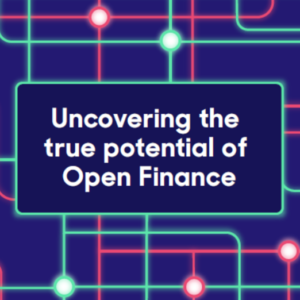Fintech feature – Tred
Tred is a profit for purpose fintech using Open Banking to help consumers to track, reduce and offset their carbon footprint. By dynamically calculating an individual’s carbon footprint using transaction data, Tred is able to provide actionable guidance that will help to make more sustainable choices. Coupled with their green debit card, Tred is actively working to reduce our carbon footprint.
We spoke to Pete Kirby and Will Smith about how Tred is using Open Finance to make a real impact.
Why did you start Tred?
90% of people don’t know their environmental impact, and traditional methods of trying to calculate your carbon footprint are static, inflexible and impersonal.
They generally involved filling out a questionnaire that asked you how often you fly, how many people you live with, the size of your house, etc, etc.
At the end you would get an estimation of your carbon footprint, but immediately doubt sprouts in your mind. How accurate can the estimate be on the back of 15-20 questions? And if I make a change to my lifestyle, how do I measure the impact of that change?
Ultimately, people are looking for an easy and simple way of seeing a more accurate carbon footprint that changes as their actions change. How can you live more sustainably if you don’t know the impact you’re having? It’s like trying to lose weight without having a set of scales – you have to measure for results.
Data is being used to help people to save money, get loans, secure mortgages – and with an environmental slant you can help them to act in a more sustainable, eco-friendly way.
So how does Tred help people to make those sustainable changes?
Firstly, we have the Tred app. Users can connect all of their existing cards using Open Banking, so every time they buy something Tred can tell you the impact that it has on the planet.
This allows you to track your specific, dynamic carbon footprint and to understand those purchases and actions that have the greatest impact. From here the app will be able suggest tips and tricks based on your habits to help nudge you in the right direction to sustainably reduce your environmental impact over time.
On top of this, Tred is the first provider that allows users to dynamically offset their carbon footprint based on their actual day to day habits – it reflects their lifestyle and is truly personal to them. On a monthly basis each transaction will be rolled up and users can contribute to projects that will plant enough trees to offset those transactions.
And finally, we’ve launched a green credit card that is made of recycled plastic, funds reforestation and feeds into the carbon footprint tracking.
Every time someone uses the card, Tred uses the profits to plant trees – so every time someone uses the card they are reminded that they are doing good for the planet, without the need to immediately change their behaviour. It’s a positive spin on the doom and gloom of climate change that can also subtly nudge people to act in a more sustainable way.
Where does the product go from here?
Once we’ve helped people to understand the day to day impact of where they are spending their money, the next big area is to see how we can support where people invest their money.
There’s a big trend towards ESG investing, but in some cases once you open the lid on a ESG fund you see some pretty surprising companies – petrochemical companies and the like.
So there’s a gap in the market for a very simple green investing with value, where you trust the business that is investing your money. It’s not just about this fund or that fund, but providing a solution where people can easily invest in renewables, or future tech, or vegan foods – based on their preferences.
You’ve just closed a crowdfunding round of nearly £1 million, what are your priorities now and for the rest of this year?
The big milestone for 2021 is to get the green debit card in user’s hands. We want to have as many people engaged with the product as possible – the more people on the platform, the greater the reduction in carbon footprint that we are able to influence. Crowd funding has definitely helped us to create an army of advocates, and even today 50% of our growth has been driven through referrals.
And the more people on the platform, the more valuable that our insight becomes, so we will be able to further enhance the tips and tricks element of the product. It’s a positive feedback loop.
Finally, the big area of focus for later this year will be investments. We’re currently user testing and designing a solution – but right now our primary aim is to launch and grow the debit card.
Ultimately, we want to tap into the masses – those that maybe don’t actively engage with eco solutions today – we need to remove any friction, remove any negatives and really add value to the consumer.
Final Thoughts
Open Finance has enabled a new area for financial services – purpose driven organisations that are seeking to marry financial management in a way that drives change for good – for consumers, for society and for the planet as a whole.
Tred’s goal is specific – to reduce our carbon footprint and environmental impact – but they have approached it in a way that allows anyone to engage with the solution and have an impact, whether that engagement is active or passive.
Dynamic, personalised carbon tracking will initially appeal to those with a more eco-conscious mindset who are probably already thinking about changing their behaviour, whilst the card offers a frictionless avenue for the masses to enact change, simply through spending as they do today. Over time this will help to raise awareness and ultimately shift people from passive engagement to active engagement.
The challenge, as ever with new entrants to the market, will be in driving advocacy for the solution beyond those to whom it immediately appeals – to tap in to the masses. Because even passive engagement with the debit card requires a behavioural shift to move from an existing card or product.
Awareness is step one, engagement step two, but behavioural change that benefits the individual and the planet is the real goal.
Read our report “Uncovering the true potential of Open Finance” for more insights on the solutions and products being developed across the industry today!
[hubspot type=form portal=5739650 id=812cf2fe-54ab-40c8-b77d-bfb98647851f]






